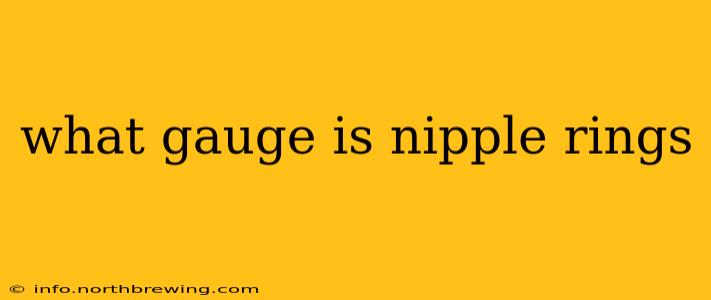What Gauge is Nipple Rings?
Choosing the right gauge for a nipple ring is crucial for comfort, safety, and the overall aesthetic. While there's no single "correct" gauge, understanding the common sizes and their implications will help you make an informed decision. This guide explores the typical gauges used for nipple piercings and factors to consider when selecting the perfect fit.
Understanding Gauge Measurement:
Before diving into specific gauges, it's vital to understand the measurement system. Gauge refers to the thickness of the jewelry, and it works inversely: a smaller number indicates a thicker piece of jewelry. For example, a 14-gauge is thicker than an 18-gauge.
Common Gauges for Nipple Rings:
The most common gauges for initial nipple piercings are 14 gauge and 16 gauge.
-
14 Gauge (1.6mm): This is a popular choice for initial piercings because it offers a good balance between strength and comfort. The thicker gauge provides more stability for the healing process.
-
16 Gauge (1.2mm): Slightly thinner than 14 gauge, 16 gauge is also frequently used for initial piercings, particularly for those with thinner nipples.
Less Common, but Still Possible Gauges:
While less common for initial piercings, you might encounter other gauges, particularly after the piercing has fully healed:
-
12 Gauge (2.0mm): This is a thicker gauge and is generally only used after the piercing is completely healed.
-
18 Gauge (1.0mm): This thinner gauge is sometimes used for initial piercings on individuals with very thin nipples, though it can pose a slightly higher risk of migration or rejection during healing.
Factors Influencing Gauge Choice:
Several factors influence the ideal gauge for your nipple piercing:
-
Your anatomy: The thickness and density of your nipples play a crucial role. Individuals with thinner nipples might be better suited to a 16 gauge or even an 18 gauge (though this requires careful consideration and consultation with a piercer). Those with thicker nipples might prefer the stability of a 14 gauge.
-
Your piercer's recommendation: A reputable piercer will assess your anatomy and discuss the best gauge for your individual circumstances. They'll consider your overall health and healing capabilities. This is arguably the most important factor in choosing your gauge.
-
Your personal preference: Once the piercing is fully healed, you have the freedom to experiment with different gauges and styles. However, it's essential to only change your jewelry with the assistance of a professional piercer to minimize the risk of complications.
What is the best gauge for nipple piercing?
The "best" gauge is subjective and depends on your individual anatomy and your piercer's professional judgment. However, 14 gauge and 16 gauge are the most commonly used and generally well-tolerated gauges for initial piercings. Always consult with a professional piercer to determine the most appropriate gauge for your specific situation.
Can I change the gauge of my nipple piercing myself?
No, you should never attempt to change the gauge of your nipple piercing yourself, especially during the healing process. Doing so can lead to infection, significant pain, and permanent damage. Only a qualified and experienced piercer should adjust the gauge of your piercing.
What if my nipple piercing is too tight or too loose?
If your nipple piercing feels too tight or too loose, it's crucial to consult your piercer immediately. They can assess the situation and adjust the jewelry if necessary. Never try to adjust the jewelry yourself.
What are the risks of choosing the wrong gauge for a nipple piercing?
Choosing the wrong gauge can lead to several complications, including:
- Infection: Improperly sized jewelry can create gaps for bacteria to enter, increasing the risk of infection.
- Migration: The piercing may move or reject the jewelry if the gauge is not suitable for your anatomy.
- Pain and discomfort: An improperly fitted piercing will likely be painful and uncomfortable.
- Tissue damage: Using a gauge that is too large can cause significant tissue damage.
In Conclusion:
Choosing the correct gauge for your nipple ring is a crucial aspect of the piercing process. Prioritizing a consultation with a reputable professional piercer, who can assess your unique anatomy and offer personalized advice, is paramount to ensuring a safe and successful outcome. Remember, their expertise guarantees a comfortable and aesthetically pleasing result while minimizing potential risks.
